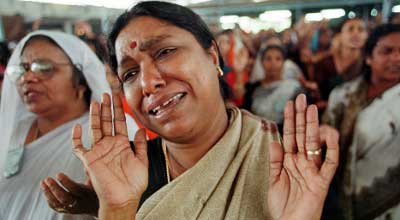The High Court of northern India’s Himachal Pradesh state on Monday questioned one of the many disputed provisions in the state’s “anti-conversion” law in a lawsuit filed by a Christian group.
“One of the two judges immediately recognized that there should be no question of the district magistrate [administrative head] granting permission or conducting an inquiry into whether a person’s faith is genuine,” a representative of the Evangelical Fellowship of India’s (EFI) Advocacy Department, the main petitioner, told Compass.
The source quoted Justice Surjit Singh as saying, “If I am dying and I want to change my religion, will I wait for some babu [official] to tell me I can do it?”
The mandatory provision in the “Himachal Pradesh Freedom of Religion Act of 2006” to advise authorities of one’s intended conversion 30 days before one converts was one of the many clauses cited as being “contrary to law, arbitrary and against the basic tenets of jurisprudence” by the petitioners.
A failure to send a prior notice is punishable with a fine of up to 1,000 rupees ($21).
At the same time, both judges, including Justice Rajiv Sharma, seemed concerned about alleged inducements to convert, “and the biggest hurdle is to overcome this prejudice,” the source added.
The court scheduled the next hearing for Sept. 26, requesting the state’s head attorney to appear before it.
“We expect the court to hear both sides,” the source said. “However, a final ruling in the matter cannot be expected immediately.”
The public-interest lawsuit by the EFI, headed by the Rev. Richard Howell, and Act Now for Harmony and Democracy, a civil society group headed by Shabnam Hashmi, was filed in the High Court in the state capital of Shimla on Feb. 22 with a plea to strike down several sections of the law. Senior Advocate Sudhir Nandrajog appeared before the court.
The petition was filed by Soli J. Sorabjee, senior advocate and former attorney general of India, and drafted by lawyers Robin R. David, Pramod Singh, Loreign Ovung, Munawwar Naseem and Tehmina Arora.
The law claims to prevent a “rise in conversions based on allurement” and is based on “a persistent demand from across the different strata of the society, urging the State Government to curb it” as, otherwise, fraudulent conversions may “erode the confidence and mutual trust between the different religious and ethnic groups in the State.”
The law in Himachal Pradesh was enacted by the former state government ruled by the Congress Party, which claims to be “secular” – a term that in India commonly means equal treatment of all religious communities. The Congress Party opposes the policies of the Hindu nationalist Bharatiya Janata Party.
While the Indian Constitution provides for full religious freedom, it is subject to public order, morality and health. The petitioners, however, argue that the term “public order,” when used as grounds for reasonable restrictions of a fundamental right, has a limited meaning narrowly tailored by the Supreme Court.
“The impugned provisions of the Act and the Rules are causing schism in the minds of the people, which outweighs the pretext of public order taken by Respondent in enforcing the impugned provisions of the Act and the Rules,” the petitioners argue.
They also argue that on several occasions, Christians have been attacked by extremist groups on the pretext of “forcible religious conversions.” On May 1, 2009, Pastor Suresh Masih Bhatti in Solan area was accused of forceful conversion, attacked and threatened with harm if he conducted further Christian meetings, says the petition. It cites several such examples to show that, contrary to maintaining “public order,” the law was causing religious tension.
The petitioners also submit that Christians in particular were unable to follow the tenets of their faith in its fullness or to interact with the people of other religions “for the fear of being inquired against and charged for violating the impugned provisions of the Act and the Rules.” They also noted that propagation of one’s faith was an integral part of the practice of Christianity.
“The impugned Act imposes severe and mandatory provisions to record and enquire into each conversion and thereby severely restricts the right to freedom of conscience and the right to privacy of an individual, thus infringing Article 21 of the Constitution,” the petitioners assert.
In March 2007, the National Commission for Minorities “noted with concern the terminology used in the [Himachal Pradesh Freedom of Religion] Act and the methodology prescribed for implementing it” and the “attempt of the Act, and reportedly by similar pieces of legislation contemplated in some other States, to interfere with the basic right of freedom of religion that is the birth right of every Indian.”
“Freedom of Religion” laws in some states in India are termed “anti-conversion” as they are used to limit conversions in general and not just those by “unlawful” means.
Anti-conversion laws are in force in the states of Orissa, Madhya Pradesh, Chhattisgarh and Gujarat, besides Himachal Pradesh. Arunachal Pradesh state has such legislation on paper, but its implementing rules are yet to be formed. Rajasthan state also passed a similar legislation, but it is awaiting consent by the president of India.
These laws define “force,” “fraud” and “inducement” vaguely, which can restrict Christian work. Although the legislation has been in force in some states for close to four and a half decades, not a single person has been convicted of wrongful conversion by any court.
Section 2(b) of the Himachal Pradesh Freedom of Religion Act terms “divine displeasure” as “force.” Section 2(d) labels an “inducement” the offer of “any gift or benefit,” contrary to Christ’s commands to feed, clothe and give drink to the poor. Section 2(b) vaguely defines as fraud “misrepresentation or any other fraudulent contrivance.”
Section 4(1) requires any person wishing to convert to give a prior notice of at least 30 days to district authorities. Yet, “no notice shall be required if a person reverts back to his own religion.”
Section 3 states that a person who is converted by any unfair means shall not be considered converted. According to Section 5, an offense under Section 3 – which includes conversion “by the use of force or by inducement or by any other fraudulent means” – is punishable with imprisonment up to two years and/or a fine up to 25,000 rupees (US$517). In case of conversion of a minor, woman, Dalit or tribal person, the imprisonment can extend to three years and the fine up to 50,000 rupees (US$1,035).
The Supreme Court in 1977 upheld the Madhya Pradesh Freedom of Religion Act in the Reverend Stanislaus vs. State of Madhya Pradesh case, ruling that the right to propagate did not include the right to convert another person. Not all in the legal fraternity, however, agree with the judgment, and it dealt with only one argument, i.e. what entails Christians’ right to propagate.
See an error in this article?
To contact us or to submit an article





















